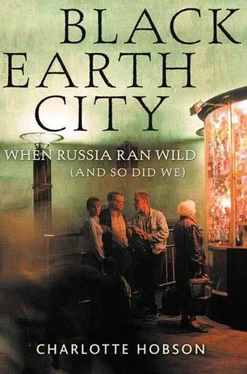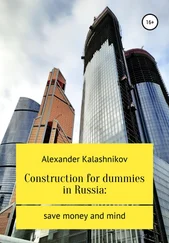I realized after a time that learning Russian was as much a matter of adapting my tone as accumulating vocabulary. Russians, for example, have none of the contorted, apologetic manner of the English. If you start out with “Would you possibly be so kind as to help me, if you’ve got a moment, to point out where the post office might be?” any Russian who is not a bureaucrat or an official will look at you as though you are mad. Soon I learned to ask simply, “Where’s the post office?” Equally, the Russian habit of saying in a commanding manner, “Give me one cigarette!” soon stopped sounding rude. Both the tone and the sentiment behind it, which assumes that the cigarette-rich person will always share them with the poor, came to feel quite natural. I was becoming Russian, it seemed to me; and the happy, swift feeling of losing myself was part of the process. “ Nichevo —it’s nothing,” I responded airily when there were problems, shortages; when, back in England, I would have grumbled. All the discomforts and the sacrifices were important, they were all necessary, and none of them mattered a bit, they were nothing— nichevo . The only piece I have come across that captures this sensation was written by a Madame Jarinstzov, in 1916:
True, with us it is nichevo when people walk into the room without knocking; or come without invitation at any time for the simple reason that they wish to see you; or men get up from their seats and pace the room up and down in the heat of a discussion during the course of a meal; all this is certainly nichevo , because these points are but trifles to a Russian mind, and the Westerner may smile with disgust or condescension at the thought of such manners!… True, again, a Russian will fly down a long, steep hill in his sleigh, cart or brougham, and will say “ nichevo !” if the vehicle happens to go into the ditch at the bottom of the hill. But in ninety-nine cases out of a hundred it would not do so, because rushing down a hill is a universally beloved thing, to which generations of horses have been used since the time when the Russian land first began to be. And if a driver did not rise in his seat, and let all the reins loose, and shout words of love and encouragement to them at the sight of a steep road downward, the horses would think that something had gone unmistakably wrong.
The Devil, too, has his Achilles heel…
RUSSIAN PROVERB
The vakhtersha beckoned me over one day with her little mittened hand and passed me a note: parcel for collection, post office number so-and-so. The building was one I hadn’t noticed before, slightly set back from the road, windows filled with the sinewy Busy Lizzie plants for which Soviet state employees feel such tenderness. The hall inside was empty. I waited and tried to breathe shallowly. The air was dense with familiar Soviet smells—damp wool, tobacco, old people—and overlaying them all an earthy, half-sweet stink, possibly human, that made the saliva run nauseating in my mouth.
After some minutes a rustling noise in the back rooms grew louder and a babushka appeared, carrying a mug of tea with a piece of black bread as a lid. Her bottom lip was clamped tight over her top and she gave no sign of noticing me. Having learned a little about such situations, I said nothing. Officials, including shop assistants, train conductors and post office workers, did not belong to the majority of Russians who liked a direct and honest approach. If you came straight out with even “Excuse me! I’ve been waiting…” or “Sorry to disturb you…” this type of babushka was liable to fly into a rage and ignore you for a full five minutes. Of course, it depended on who you were: pensioners, in particular veterans of the Great Patriotic War, had special privileges. They would have let out a spittle-beaded stream of abuse the minute they saw her. Otherwise the best technique was simply to stand there looking polite, and when the babushka finally glanced up, to thrust the ticket at her with a gush of flattering entreaty. “Please, comrade, be so kind, I have a parcel waiting here?” If she still looked unconvinced, you might add an emotional appeal: “From far away in my home country, how I’ve been missing it!”
This time, however, there was no need. When the woman read my name on the ticket she threw her hands up. “ Slava Bogu! Thank goodness you’ve come.”
She returned within a few seconds with a box and pushed it at me, forgetting even to stamp my receipt for her records. The parcel was postmarked six weeks previously. It was also, clearly, the source of the filthy smell.
“Off you go, dochka . Take it, and good health to you!”
The box felt faintly warm in my hands as I carried it back to the hostel. Mitya was in my room when I arrived. He stubbed out his cigarette and together we slit open the packing tape. The box gave off a faint hiss and a stink that made us fall back and cover our mouths. Even Joe stirred in his sleep.
“Jesus,” he muttered. “Sorry, everyone.”
At the bottom of the box was a cellophane packet blown up like a balloon, containing a blackish, lumpy puddle.
“What is it?” whispered Mitya, awed.
“I don’t know,” I whispered back. “But six weeks ago, I think it might have been… camembert.”
This hunch turned out to be right. A friend had made up a parcel of delicacies that were hard to come by in Voronezh: chocolate, potato chips, magazines, and—my favorite—a piece of camembert. Not, perhaps, the most practical cheese to send by mail. Six weeks had seen it pass through some intense organic processes.
“But why did it have to sit there so long?”
“That’ll be the KGB, the bastards,” said Mitya, lighting a cigarette hurriedly. “They’d never seen French cheese before. Half-wits.”
It was a memorable introduction to the secret police: a smell so bad you could almost hear it howl.
I was inclined to treat the KGB more as rumor than as reality, until they started leaving deliberate hints. For example, not only had the letter inside my parcel been opened and read, but someone had put a cup of coffee down on it. Our mail was always erratic, but occasionally a letter was delayed by months rather than weeks and arrived with words underlined, or with mysterious red marks in the margin. Whoever made these seemed not to understand English very well—perhaps they had simply been given a list of key words to identify. A friend received a letter in which her mother described setting off on holiday: “We had to wait for an hour at the bank to pick up our foreign currency, and another to get the visa, so we rushed to the station and only just caught the train.” In a dusty little office somewhere in Voronezh, a guardian of Soviet security had carefully underlined “foreign currency,” “visa,” “station,” and had passed the pages on to his superior to request further action. The letter took several months to arrive.
Then several friends in the hostel told us they had been called in for questioning—a friendly chat, apparently, in the blank-faced office block on Plekhanov Street.
“So, how’s life in the hostel?” the officer would ask. “Are Ira and Joe still together? Are they getting on well? Emily and Yuri, they going to get married? Or not? Eh?”
This sounded implausible to me. Surely, in these times of economic crisis, even the KGB had to earn a living. What was the sense in paying these pathetic juniors—Cinderellas in brown suits—to stay late at the office, copying out reports of our student parties? On the other hand, of course, the thought of files marked with our names being filled with details of hostel life was wonderfully comical, not to say glamorous. Perhaps they would be forwarded to Moscow, where some smooth-cheeked colonel would tap my documents, gaze out of the window and mutter, “Hmm, Charlotte Hobson… she sounds interesting.” It added a piquancy to life to imagine a secret biographer at our backs. We felt we had to keep providing him with material.
Читать дальше












